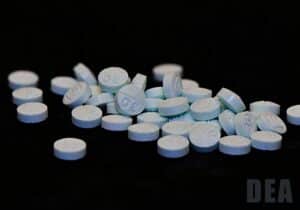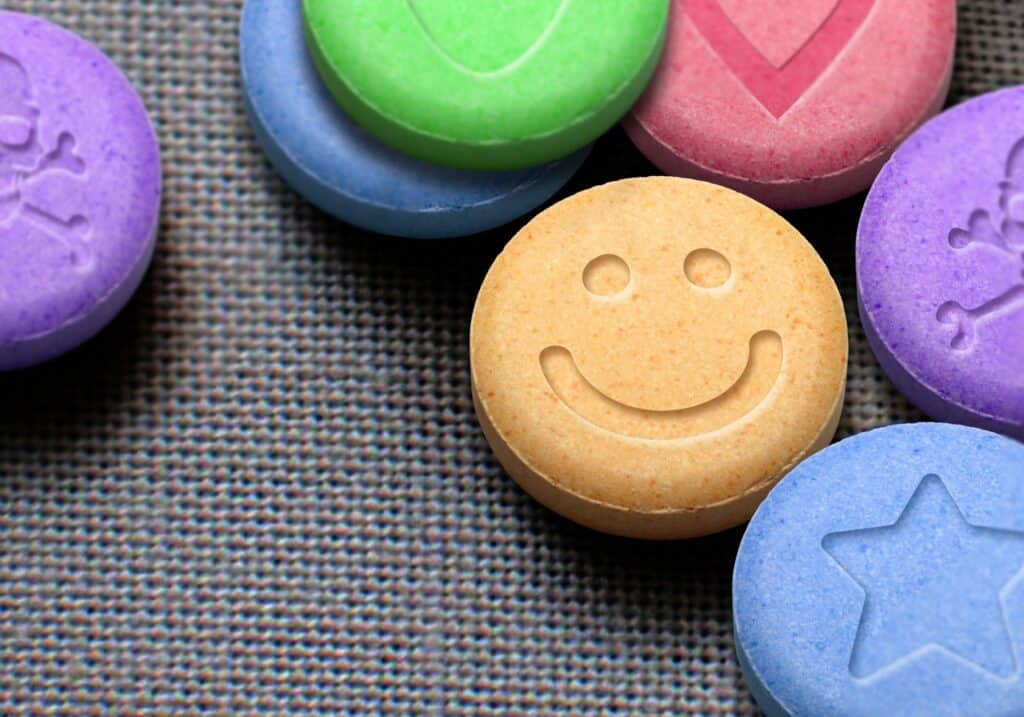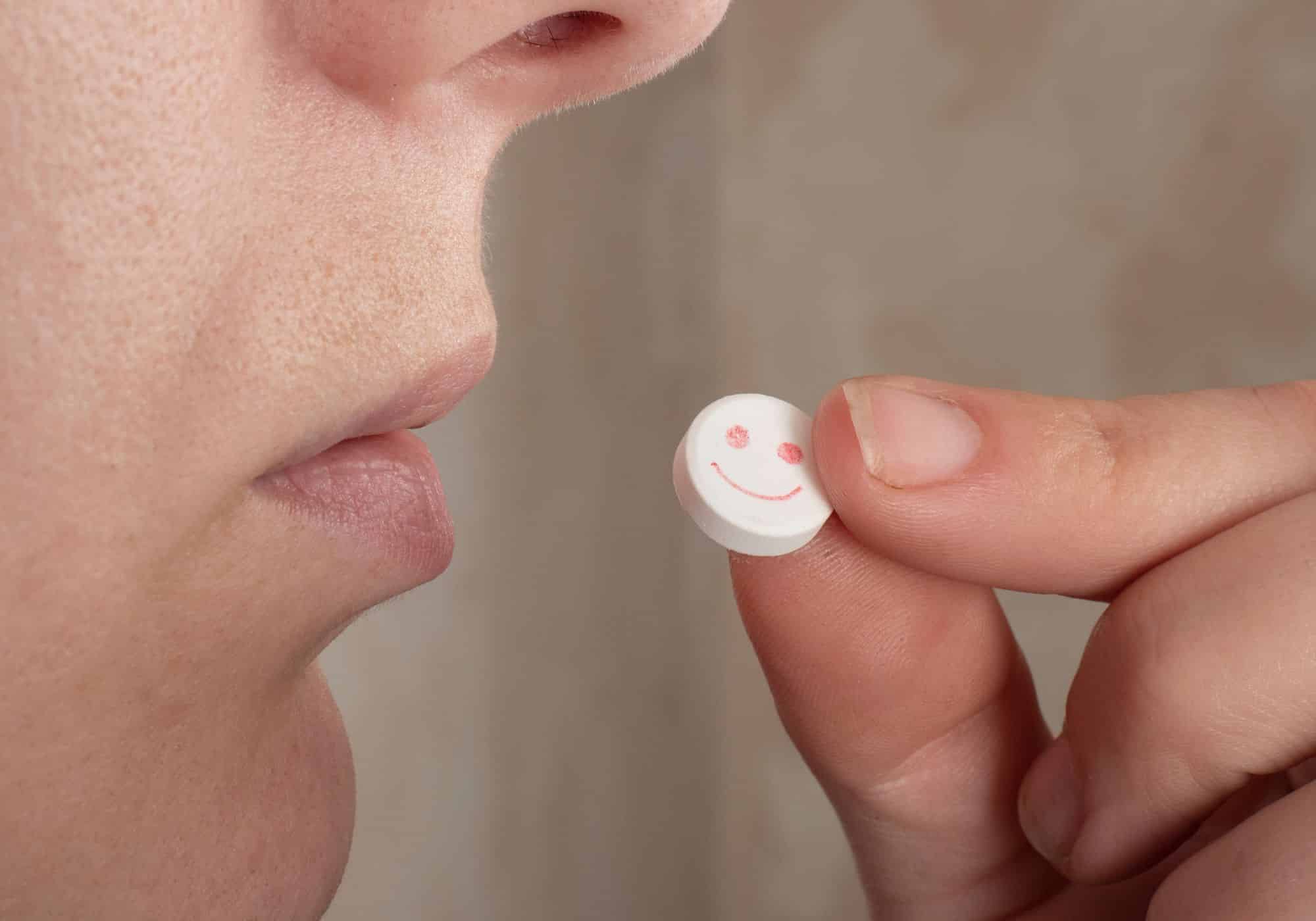Table of Contents
What is MDMA (Molly/Ecstasy)?
MDMA, commonly referred to as ecstasy or molly, is a psychoactive substance that’s illegal in many places. This drug is a stimulant with psychedelic effects, significantly influencing brain neurotransmitters such as serotonin, dopamine, and norepinephrine. Users of MDMA often report an increase in mood, enhanced empathy, emotional closeness, and heightened sensory experiences impacting sight, sound, touch, and taste.
The euphoric sensations associated with MDMA can persist for up to six hours. However, the drug’s intense stimulation of serotonin release can lead to considerable mood fluctuations and depression as its effects wear off. Regular or prolonged use of MDMA can result in the degradation of neurons vital for serotonin and dopamine production, posing a risk of long-term neurological damage.
MDMA is also known by various other street names, including:
- MOLLY
- ADAM
- ECSTASY
- SCOOBY SNACKS
- X
- LOVE DRUG / HUG DRUG
- E
- E-TART
For individuals dealing with MDMA addiction, seeking professional assistance is crucial. Addiction treatment experts, such as those at Iris Wellness Group, provide specialized support and tailored guidance for recovery. If you or someone you know is struggling with MDMA use, consider reaching out to get the help needed. Contact us at 423-401-9630 to start your journey towards recovery from MDMA addiction in Chattanooga, TN.
What are the Signs of MDMA Addiction?
MDMA, popular for its mood-enhancing effects, has the potential for addiction. According to the DSM-5, a highly regarded diagnostic manual, there are specific criteria to identify a hallucinogen use disorder, which includes MDMA addiction:
- Using MDMA in larger amounts or over a longer period than was intended.
- Persistent desire or unsuccessful attempts to cut down or control MDMA use.
- A considerable amount of time spent in activities necessary to obtain, use, or recover from MDMA’s effects.
- Craving, or a strong desire to use MDMA.
- Recurrent MDMA use resulting in a failure to fulfill major role obligations at work, school, or home.
- Continued use despite having persistent or recurrent social or interpersonal problems caused or exacerbated by MDMA.
- Important social, occupational, or recreational activities are given up or reduced because of MDMA use.
- Recurrent MDMA use in situations where it is physically hazardous.
- MDMA use is continued despite knowledge of having a persistent or recurrent physical or psychological problem that is likely to have been caused or exacerbated by MDMA.
- Tolerance, as defined by a need for markedly increased amounts of MDMA to achieve intoxication or desired effect.
It is essential to acknowledge that withdrawal symptoms specific to MDMA are not fully recognized in the diagnostic criteria.
Based on these symptoms, the severity of MDMA addiction can be categorized as:
- Mild Addiction: Presence of 2 to 3 symptoms.
- Moderate Addiction: 4 to 5 symptoms.
- Severe Addiction: 6 or more symptoms.
Recognizing these signs is essential for assessing the extent of MDMA addiction and taking steps toward recovery. If you or someone you know is exhibiting these symptoms and needs help, don’t hesitate to reach out. Call us at 423-401-9630 to begin your journey towards overcoming MDMA addiction in Chattanooga, TN.
Effects of Ecstasy Use
MDMA, widely known as ecstasy, typically takes effect within 30 to 45 minutes after ingestion and its effects can last between 3 to 6 hours. Commonly reported experiences include feelings of emotional warmth, increased sense of closeness with others, euphoria, boosted energy levels, and enhanced sexual arousal. However, the use of ecstasy is not without adverse effects. Some of the less favorable side effects users may encounter include:
- Nausea and headaches
- Dry mouth
- Reduced appetite
- Visual disturbances
- Uncontrolled jaw clenching
- Stiffness in muscles and joints
- Blurry vision
- Anxiety
- Disorganized or confused thinking
- Paranoia
- Excessive sweating and chills
Particularly concerning is the use of ecstasy in settings like nightclubs or raves, which often combine high temperatures with vigorous physical activity such as dancing. This combination significantly increases the risk of hyperthermia, or a dangerously elevated body temperature. Hyperthermia can lead to serious health complications like dehydration, fainting, seizures, and potentially life-threatening organ failure, especially affecting the kidneys, liver, and heart.
Long-term and heavy usage of ecstasy has been linked to cognitive challenges in some studies, including issues with memory and learning capabilities. Furthermore, many individuals who use MDMA also consume marijuana, which can intensify cognitive impairments. The combined impact of these drugs can be more detrimental than the effect of each substance on its own.
Why do People Use MDMA?
MDMA, often referred to as ecstasy, is a popular choice for those looking to intensify their sensory experiences and elevate their enjoyment, particularly in social environments. It’s frequently used in lively settings like nightclubs or concerts, where its effects synergize well with the dynamic atmosphere. The drug is sought after for its ability to enhance tactile sensations, boost sexual arousal, and deepen emotional connections. These effects are especially appreciated by users who enjoy activities like dancing, where they can fully immerse themselves in the enhanced sensory experience provided by MDMA.
Signs and Symptoms of Molly Use
Frequent use of ecstasy, also known as Molly, can manifest in various physical and emotional symptoms, which may signal the need to assess for MDMA addiction.
Key signs and symptoms of Ecstasy Use:
- Overheating in Social Environments: Ecstasy activates the sympathetic nervous system, leading to excessive sweating and overheating, particularly in crowded settings like clubs or parties.
- Cognitive and Mental Health Symptoms: Regular Molly users may experience memory issues, confusion, and occasionally hallucinations. The drastic shifts in neurotransmitters due to repeated use can result in lasting problems.
- Mood Fluctuations: Users of ecstasy often undergo rapid mood changes, ranging from hyperactive and sociable states to periods of lethargy and depression.
Identifying Items Associated with Ecstasy Use:
- Mentholated Inhalers and Rubs: Those using ecstasy might use vapor rubs, typically for cold relief, to enhance breathing and potentially intensify the drug’s effects.
- Face Masks: Users may put menthol oils or vapor rub inside masks to inhale the vapors.
- Pacifiers: To counteract teeth grinding, a common side effect of ecstasy use, some individuals use pacifiers.
- Tools for Snorting: Users who consume MDMA in its powdered form might possess items such as razor blades, rolled bills, or mirrors for snorting the drug.
Being aware of these symptoms and related paraphernalia is crucial in identifying and addressing MDMA use and potential addiction. If you recognize these signs and need help, contact us at 423-401-9630 to start your journey to recovery from Molly addiction treatment in Chattanooga, TN.
Side Effects of MDMA Addiction
Extended use of MDMA, commonly known as ecstasy, can lead to serious consequences for both mental and physical health.
Mental Health Implications
A significant concern is the possible development of concurrent mental health disorders, such as depression, anxiety, or even psychosis. These conditions may persist well beyond the cessation of ecstasy use. This risk is heightened with higher or more frequent doses and is exacerbated when MDMA is combined with other substances.
Physical Health Consequences
The physical complications associated with MDMA addiction can be severe and include:
- Elevated blood pressure
- Increased heart rate
- Hyperthermia (dangerous body overheating)
- Seizures
- Potential damage to liver and kidneys
- Higher risk of cardiovascular issues
Additionally, MDMA addiction can contribute to a range of social, economic, and legal problems, affecting various aspects of an individual’s life. Understanding these risks is crucial for anyone using or considering the use of MDMA.
Short-Term Effects of MDMA Abuse
MDMA, often abused for its euphoric effects, carries several immediate risks due to its influence on the sympathetic nervous system. These risks include dehydration and overheating, with repeated use possibly leading to seizures.
Moreover, MDMA can induce a series of mood swings, manifesting as anxiety, impulsiveness, reduced sexual interest, depression, impaired judgment, and aggressive behavior.
Other short-term effects of MDMA use are:
- Blurred vision
- Decreased appetite
- Nausea and vomiting
- Weight loss
- Hyperactivity
- Muscle cramps
- Teeth grinding
Recognizing these risks is vital for individuals using MDMA and for their close ones. It highlights the necessity of seeking professional help for addiction, to mitigate these immediate and potentially harmful effects.
Dangers of Ecstasy Use
When consuming MDMA, particularly in forms like ecstasy pills, capsules, tablets, and powders obtained illicitly, users face the considerable risk of inadvertently ingesting other substances. Many individuals believe they are purchasing pure ecstasy, but the actual contents often differ significantly. These MDMA products might contain various substances, including methamphetamine, PCP, ketamine, cocaine, caffeine, pseudoephedrine, heroin, PMA (par methoxyamphetamine), dextromethorphan (a common cough suppressant), and synthetic cathinones, also known as bath salts. The unintended intake of these substances can result in severe and sometimes fatal outcomes.
Between 2017 and 2021, the U.S. saw a significant rise in the distribution of eutylone, a type of synthetic cathinone. This increase sparked concerns about heightened overdose risks, especially since eutylone has often been misrepresented as MDMA. Research indicates that many fatalities related to eutylone involve the illicit use of fentanyl. Remarkably, studies reveal that approximately 1 in 10 eutylone-related deaths in 2020 were linked to individuals with a history of MDMA use, yet no MDMA was detected in their toxicology screenings. This finding underscores the alarming possibility that people may be unknowingly consuming eutylone and other cathinones, while believing they are using MDMA.
How Long Does MDMA Stay in Your System?
The duration MDMA stays in one’s system can significantly vary, largely dependent on several factors, including the individual’s metabolism, dosage, and frequency of use. On average, MDMA’s half-life is around 8 to 9 hours in adults, meaning it takes about that time for the body to reduce the drug concentration by half.
Ecstasy Withdrawal
Ecstasy, also known as MDMA, is a synthetic substance famed for its euphoric properties, yet it carries a high risk of psychological addiction. Withdrawal from MDMA sets in when an individual ceases using the drug, challenging the brain to readjust to its absence. Regular ecstasy usage enhances neurotransmitters associated with happiness and affection, but this overstimulation leads to a depletion of the brain’s natural reserves of these chemicals. Consequently, cessation of ecstasy use typically results in withdrawal symptoms, which often manifest as the reverse of the drug’s initial effects.
Symptoms of Ecstasy Withdrawal May Include:
- Depression
- Confusion
- Anxiety
- Intense Cravings
- Agitation
- Paranoia
- Insomnia
The intensity and length of MDMA withdrawal symptoms differ from individual to individual and are influenced by several factors, including the user’s tolerance level, frequency and length of drug use, metabolic rate, general health, age, gender, genetic factors, and any concurrent addictions or mental health conditions. While the withdrawal symptoms are predominantly psychological, some physical effects may also be present. Recognizing and understanding these various factors is crucial for the effective management and treatment of MDMA withdrawal.
MDMA Overdose
As the recreational use of MDMA, commonly known as Ecstasy or Molly, increases, understanding the risks of an overdose becomes critically important. Overdosing on MDMA can lead to serious health issues, such as irregular heartbeats, extreme body temperature dysregulation, and hyperthermia, which is particularly dangerous in high-energy environments like dance parties. Additionally, there’s a risk of rhabdomyolysis, an acute muscle breakdown that can lead to kidney damage, as well as seizures.
A major concern is the possibility of serotonin syndrome, a potentially fatal condition that can occur when MDMA is mixed with other drugs that enhance serotonin levels. It’s crucial to recognize the symptoms of serotonin syndrome:
- Rapid heart rate
- Significant fluctuations in body temperature
- Muscle rigidity
- Confusion
Immediate medical intervention is critical in the event of an MDMA overdose. Prompt, informed action can avert long-term health damage and is potentially life-saving. This highlights the importance of awareness and quick response in situations involving MDMA. This knowledge is vital not just for those who use MDMA, but also for caregivers, healthcare professionals, and the community at large, to ensure safety and promote health.
How is MDMA Treated?
Young adults are particularly susceptible to MDMA addiction, making it crucial to have substance abuse treatment programs that specifically cater to the unique challenges faced by this age group, including adolescents, teens, and young adults.
While MDMA doesn’t have a distinct withdrawal syndrome, treatment often begins with either an inpatient or an intensive outpatient program. The key elements of MDMA addiction treatment include:
- Counseling: Personalized therapy sessions are fundamental, providing an opportunity to explore the intricacies of your addiction in-depth. Group counseling also plays a vital role, offering a communal space to share experiences and gain strength from peers who are on similar journeys towards recovery.
- Psychotherapy: Cognitive Behavioral Therapy (CBT) is a core component of the treatment process. It assists in understanding the interplay between thoughts, emotions, and actions, and develops effective coping mechanisms for sustained recovery from MDMA abuse.
- Family Therapy: Recognizing that addiction impacts not just the individual but also their family, integrating family therapy into the treatment regime is crucial. This approach helps repair relationships strained by substance misuse and creates a nurturing environment conducive to recovery.
Addressing any concurrent mental health issues in tandem with MDMA addiction treatment is essential. This holistic approach ensures a thorough and effective pathway to recovery.
Common Drug Combinations with MDMA
MDMA, often sought for its ability to enhance sexual arousal, is frequently mixed with a variety of substances, each combination producing unique effects:
- Viagra (referred to as “Sextasy” or “Trail Mix”): This mix is favored for enhancing sexual experiences.
- LSD: Combining MDMA with LSD is known to heighten hallucinogenic and psychedelic experiences.
- PCP: When MDMA is taken with PCP, it can lead to more intense hallucinations and altered states of consciousness.
- Mushrooms: Using mushrooms and MDMA together often amplifies the sensory and psychedelic effects.
- Ketamine: This combination can induce a trance-like state with heightened tactile sensations.
- Amphetamine: Mixing MDMA with amphetamine such as methamphetamine may boost energy and alertness but can also result in extreme fatigue.
- Mescaline: Pairing MDMA with mescaline can lead to stronger visual and sensory experiences.
- Alcohol: Consuming alcohol while using MDMA can heighten the risk of dehydration and other negative outcomes.
It is crucial to understand that combining MDMA with these substances can significantly enhance the experience but also greatly increases the likelihood of dangerous or even fatal consequences.
Ecstasy Addiction Treatment and Rehab
While there are no specific medical treatments exclusively for ecstasy addiction, various behavioral therapies proven effective in treating other substance use disorders are applicable. Here’s an overview of common strategies in treating ecstasy addiction:
- Detoxification: This initial phase employs medications and other methods to safely manage withdrawal symptoms, prioritizing the individual’s comfort throughout the process.
- Inpatient or Residential Care: This approach involves staying in a residential facility or hospital, where 24/7 monitoring is provided. It typically encompasses a blend of individual and group counseling, educational sessions, and behavioral therapies, notably cognitive-behavioral therapy (CBT). CBT is particularly effective in aiding individuals to recognize and alter thought patterns and behaviors linked to ecstasy use. It also focuses on stress management skills and relapse prevention strategies.
- Outpatient Services: Outpatient programs for MDMA addiction mirror many aspects of inpatient care but offer the flexibility to live at home or in a sober living environment. The intensity and frequency of these sessions are tailored to each person’s unique situation, ranging from weekly meetings to multiple intensive sessions per week.
- Aftercare: Ongoing support after the primary treatment phase is vital for sustained sobriety. This may include continued counseling, participation in alumni networks, mutual-help groups, and regular group therapy sessions.
Insurance may cover a portion of the treatment costs. If you or a loved one is grappling with MDMA addiction or misuse, reach out to Iris Wellness Group at 423-401-9630 for assistance.
Does Insurance Cover MDMA Rehab?
Yes, plenty of MDMA rehab centers accept various forms of in-state and out-of-state insurance plans. To find out whether or not your insurance will cover the full or partial cost of your treatment, simply provide your insurance information on our verify insurance form and an Iris Wellness Group admissions representative will inquire on your benefits or call us now at 423-401-9630.
MDMA Addiction Treatment at Iris Wellness Group
Iris Wellness Group specializes in MDMA addiction treatment in Chattanooga, TN, crafted to guide individuals toward a life beyond dependency. Our approach is holistic, acknowledging the frequent coexistence of substance use and mental health disorders. This dual diagnosis treatment is crucial, reflecting findings like those from the 2021 National Survey on Drug Use and Health, which reported 17.9 million adults over 18 having simultaneous substance use and mental health issues.
Our comprehensive strategy for treating Ecstasy addiction includes:
- Individual and Group Therapy: Offering both personal and shared support and insights.
- Family Therapy: Focused on healing and reinforcing family relationships impacted by addiction.
- Holistic Therapy: Embracing methods that cater to overall well-being, extending beyond traditional therapy.
- Red Light Therapy: Innovative techniques aiding the recovery process.
- Cognitive Behavioral Therapy (CBT) and Dialectical Behavior Therapy (DBT): Proven therapies for altering detrimental thought patterns and enhancing emotional control.
- Peer Support: Gaining strength and understanding from fellow recovery individuals.
- Relapse Prevention and Healthy Coping Skills: Essential tools for long-term sobriety.
- Psychoeducation: Broadening understanding of addiction and mental health.
- Recreational Therapy: Activities that foster a healthy lifestyle.
- Partial Hospitalization Program (PHP): Intensive outpatient support for more critical cases.
- Intensive Outpatient Program (IOP): Versatile treatment options for balancing recovery with everyday life.
- Outpatient Detox: A manageable detoxification process that allows patients to receive treatment while maintaining their daily routines and responsibilities.
- Post-Recovery Program: Continued support to maintain treatment gains.
At Iris Wellness Group, our dedication lies in customizing treatment plans to each client’s specific needs and aspirations. Our continuum of care, from intensive outpatient programs to ongoing post-recovery assistance, is designed to ensure lasting wellness and recovery. Reach out to us today to embark on your journey of Ecstasy addiction treatment in Chattanooga, TN.












